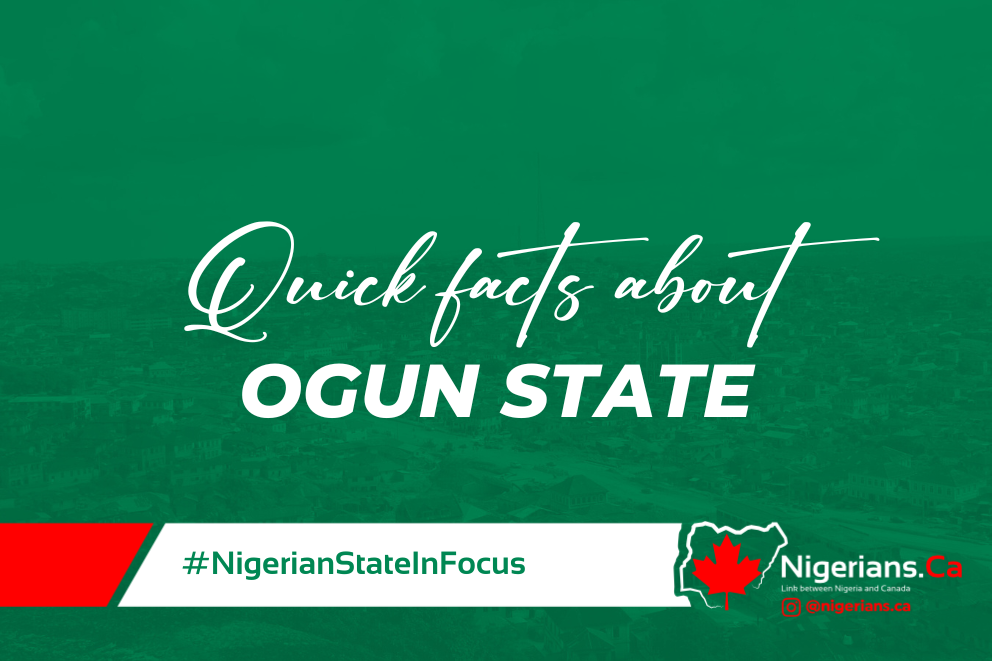Ogun State is one of the six states that make up Nigeria’s South-West geopolitical zone. It shares an international boundary with the Republic of Benin to the West and has inter-state boundaries with Oyo State to the North, Lagos State to the South, Ondo and Osun States to the East.
Abeokuta is both Ogun State's capital and most populous city; other important cities in the state include Ijebu Ode, the royal capital of the Ijebu Kingdom, and Sagamu, Nigeria's leading kolanut grower.
In terms of landmass, Ogun State is the 24th largest State in Nigeria with land area of 16,762 kilometer square.
Nicknamed the "Gateway to Nigeria", the state is notable for having a high concentration of industrial Estates and being a major manufacturing hub in Nigeria. Major factories in Ogun include the Dangote Cement factory in Ibese, Nestle, Lafarge Cement factory in Ewekoro, Memmcol in Orimerunmu, Coleman Cables in Sagamu and Arepo, Procter & Gamble in Agbara, amongst others.
Ogun State indigenes belong to the Yoruba ethnic group, comprising mainly the Egba, the Yewa, the Awori, the Egun, the Ijebu and the Remo. The two main religions in the state are Christianity and Islam. Traditional religion is still practiced, though not by a large proportion of the people.
Ogun State lies entirely in the tropics. Its key agricultural resources include cocoa, kola nut, rice, maize, cassava, yam, banana, timber, rubber, livestock and palm oil. Ogun State’s mineral resources include limestone, gypsum, kaolin, gemstone, feldspar, phosphate, mica, glass, clay, granite, and bitumen. Companies located in the state include GlaxoSmithKline, Coca-Cola, Dangote Cement, Lafarge Cement and Consolidated Breweries.
Ogun state can also be regarded as the “State of The First” ; The first local government district in Nigeria, “Abeokuta South,” the first church in Nigeria, “St. Peter’s Anglican Church,” and the first hospital in Nigeria, “Sacred Heart Hospital,” are all located in Abeokuta; The state Capital.
The Olumo Rock in heart of Abeokuta was discovered in the 19th century and used as a fortress during the inter-tribal wars of the time. It is an imposing structure standing at a height of 137 metres. The Rock houses a tree that is said to be more than 200 years old and sheds its leaves throughout the year. There are several carvings on the Rock and there are living areas for the priestesses of the Rock’s deity.
The Ojude Oba Festival is a major cultural event in Ijebu Ode. This annual festival takes place on the third day after the Ileya (Eid al-Kabir) celebration to unite the people of Ijebu Ode both at home and in the diaspora. During the festival, the people gather in the centre of the town to pay homage to the Awujale who is the paramount ruler of the land. It is one most important festivals in the state. Other major cultural events in the state are the African Drums, Agemo, Egungun, Lisabi and Ogun Festivals.
Ogun State is the only state in Nigeria with two state-owned universities, and it has the most higher education institutions per capita. The first university of education in Nigeria is located in Ogun State.
The shrine of Bilikisu Sungbo in the Oke-Eri village, Ijebu-Ode, Olumo Rock in Abeokuta, Ebute-Oni and the Iwopin Boat Regatta in Ogun Waterside, and the Oyan Dam in Abeokuta North are just a few of the tourist sites in Ogun State.
According to a May 2016 CNBC Africa article, Ogun State has emerged as Nigeria’s new industrial centre and is thought to be the nation’s most industrialised state. Nigeria’s output of chicken products is heavily influenced by Ogun State. In addition, Ogun state is the only place where the well-known Ofada rice is grown. The town of Ofada is where the rice is cultivated.
Obafemi Awolowo, MKO Abiola, Mike Adenuga, Olusegun Obasanjo, Wole Soyinka, Fela Kuti, and Tunde Bakare are just a few of the noteworthy individuals from the gateway state.





